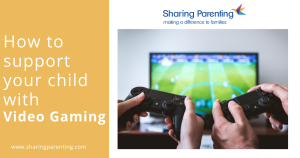We know that video gaming is now one of the dominant forms of entertainment and also one that’s causes parents anxiety.
Although there are benefits to gaming the addictive nature to adrenalin caused by this activity can leave teenagers spending hours online and many frustrated parents.

What can a parent do to support their child with video gaming?
- Be aware its not all negative and there are positives to gaming – meeting new contacts/ working as a team on some games.
Explore the positives and negatives of gaming with your child so they understand why you may seem worried or negative about it.
Talk to your children about the positives and ask them what they like about gaming.
- Don’t be negative about online gaming as this may frustrate your teen and limit open communication
Keep the communications open – ask them who they play with and what they like about it.
- Create limits on online gaming /screen time.
Be consistent -it may be hard to enforce these at first but preserve. (Talk to your child in advance and agree the amount of time they will be on each day. Talk about how they will stop, how they will know when to stop – they/you could set an alarm on their phone? Think about an activity they will have lined up when they come off the game).
- Talk about/raise awareness of the risks of gambling and online addiction?
Talk to your children about good habits to get into to stay in control and why you are setting these limits.
- Talk about positive mental health/mental health awareness?
Help them to recognise signs that their bodies are telling them they need a break. Feeling sad or grumpy etc.
- Foster open communication with your child/teen
Be aware of having creating social time with your child/ aware that gaming can weaken social interaction, which is needed for communication, jobs/ relationships.
Create opportunities for conversation – sitting at the table at meal times, cooking together, whilst travelling in the car or one a walk.
- Talk about self care and be a role model on how to look after ourselves both mentally and physically.
Share the things that you do to keep mentally healthy and how you feel if you don’t make time for these things. These are good life lessons that they will. carry into adulthood. See filling your jug.
- Encourage offline activities and family time too.
Think about activities you can do together – go for a walk, cycle ride, bake/cook together, play a board game etc.
You may also be interested in information about Parenting Teenagers